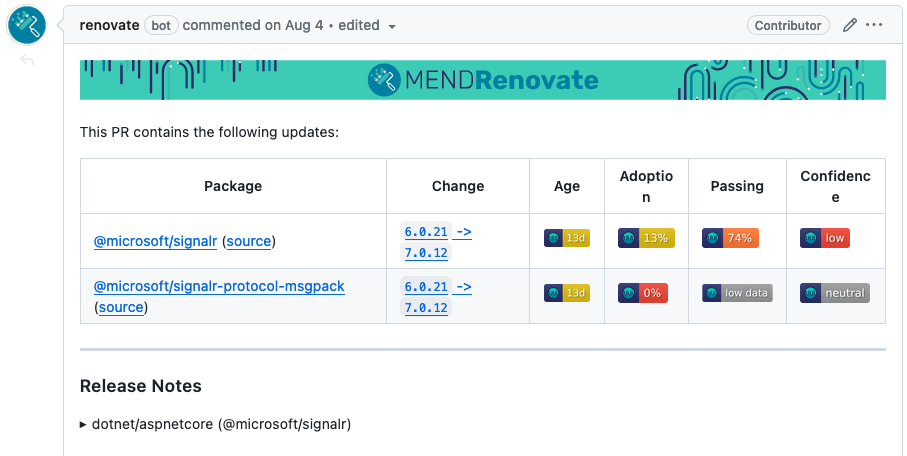Dependency Management
Bitwarden uses Renovate for automating dependency updates. Renovate will automatically create pull requests for dependencies on a weekly cadence. Security updates will generate pull requests immediately.
Ownership
Bitwarden's repositories fall under two categories: team-owned and shared.
Team-owned repositories
Team-owned repositories are "owned" by a single team from a dependency standpoint. The assigned team is responsible for reviewing, approving, and merging dependency updates. Some reasons a repository might be team-owned are that it's primarily developed by that team, or to balance out the number of dependencies teams have to manage.
Some examples of team-owned repositories are directory-connector, which is owned by the
Admin Console team, and key-connector, which is owned by the Auth team.
Shared repositories
Shared repositories don't have any direct owner. Instead each dependency is allocated to a team. The team assigned to a dependency is responsible for reviewing, approving, and merging that dependency. For major upgrades the team is responsible for coordinating the upgrade with the other teams.
Examples of shared repositories are server and clients.
Example PR

Renovate PRs contain several areas of interest. The above example PR contains two grouped
dependencies. The PR proposes to upgrade the dependencies from 6.0.21 to 7.0.12. The age of the
version is 13 days, and 13% of repositories have adopted this version. Renovate has seen a
74% test success rate across Renovate-managed repositories and has a low confidence in the
change. For more details read
Renovate documentation about Merge Confidence.
Workflow
Renovate will automatically create pull requests during the weekend, which naturally aligns with each team allocating some time during the following Monday to work through their respective queue of pull requests. The teams should work together to resolve outstanding pull requests within the week to avoid stagnation.
The main exception being major upgrades that can sometimes take a longer amount of time to coordinate. Ideally the team will have already coordinated and resolved deprecations in advance.
A Renovate PR may contain a single dependency or a group of related dependencies. At Bitwarden, we typically group dependencies we know are related and should be upgraded at the same time. We try to keep groups as small as possible to minimize the impact and increase confidence in approving and merging.
Review
A typical dependency workflow involves the following steps:
- Read the proposed changes.
- Review the release notes of each dependency, for each released version between the current and
the proposed upgrade. Identify if there are any deprecations or breaking changes affecting our
code.
- For breaking changes, either resolve them yourself, or for major changes, coordinate with the other teams.
- For deprecations, create high priority Jira tickets on the affected teams' backlogs with a due date at least one sprint before the next scheduled major release of the dependency.
- Verify CI status.
- If test coverage is lacking, check out locally and manually confirm a few key areas.
- Review the proposed code changes and approve the PR.
- Write a Jira ticket containing testing notes for QA.
- Merge the PR. Assign the Jira ticket to QA.
If you need to change the code to resolve any issues, please tag a team member for the final review.
Jira ticket
The handoff between developers and QA will be a Jira ticket. The ticket should contain the affected dependency, any relevant release notes for sections to test, and some testing notes on affected areas.
QA testing
While developers are responsible for writing a Jira ticket with testing notes, the QA engineer should practice due diligence by also considering the impact of the dependency change and if needed discuss with the engineer about potentially increasing or decreasing the scope of testing.
Reverting
In the event QA finds a regression, the developer is responsible for assessing the impact and either immediately revert the update or resolve the regression in a new PR.
Closing irrelevant PRs
Sometimes Renovate will create PRs for dependencies that we are currently unable to upgrade for
various reasons. For example, contributing-docs depends on docusaurus, which supports specific
versions of react. We cannot upgrade react until docusaurus supports it.
In those cases the team can comment on the PR with a reason for not yet upgrading and either close or defer it until a later date. If a team closes a PR it is expected that its members monitor the dependency and revisiting the upgrade in the future.
Renovate configuration
Renovate is configured by a .github/renovate.json file in each repository. We follow an internal
template for consistency. The template is available at the
template repository.
Renovate uses a concept called
PackageRules that allows us to
specify ownership of dependencies and ensure the appropriate team is added as reviewers. Below is an
example assigning @angular/core to the Platform team.
{
"matchPackageNames": ["@angular/core"],
"description": "Platform owned dependencies",
"commitMessagePrefix": "[deps] Platform:",
"reviewers": ["team:team-platform-dev"]
}
For repositories maintained by a single team there is no need to use packageRules to assign
ownership. Instead ensure appropriate code owners are set up.